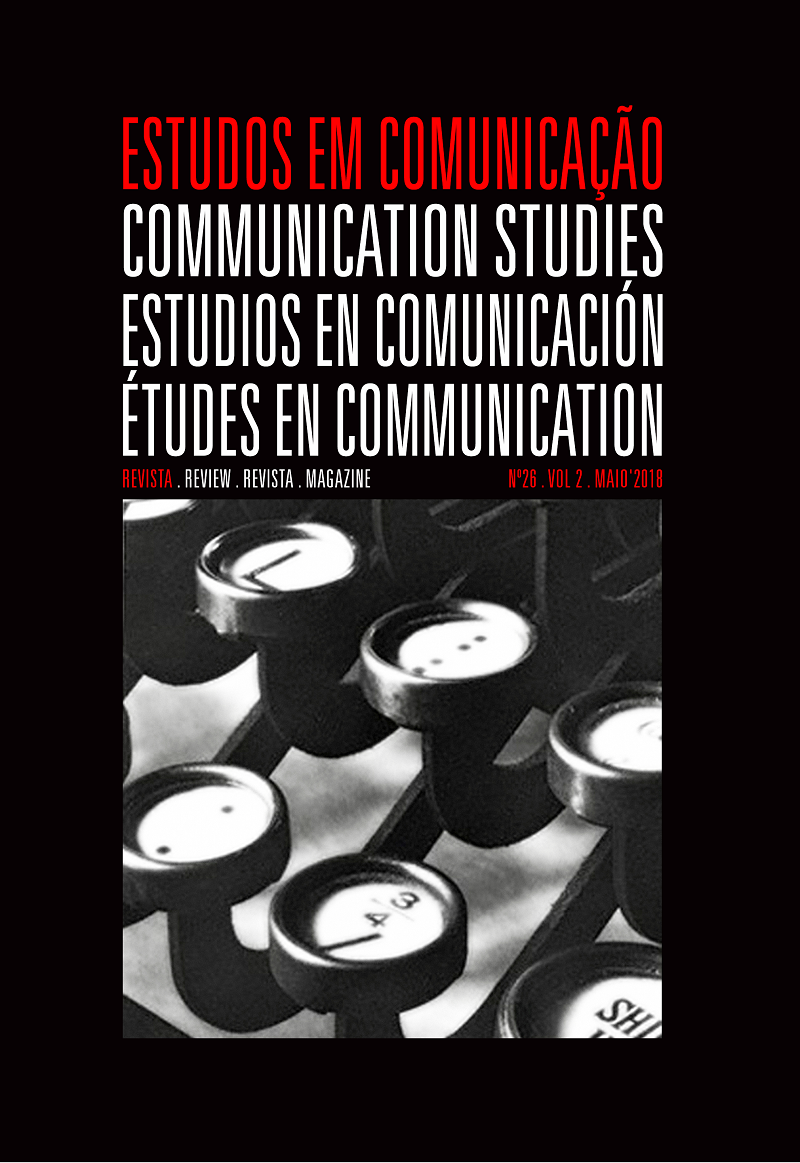A neofeudalização da política mediatizada e a construção narrativa sobre a corrupção no Brasil
Keywords:
corruption, Dilma Rousseff, midiatization, narrative, neofeudalization.Abstract
This paper aims to reflect on how the narrative on corruption constructed prior to the impeachment of President Dilma Rousseff in Brazil in 2016 shaped the Workers’ Party (PT) as the only and most corrupt in the country, by pointing out that the end of corruption in Brazil would depend on the party’s departure from the power, therefore, of the then President of the Republic, considered as colluding with the dubious practices of his party. We analyze 6 editions of two Brazilian newspapers with large national circulation, Folha de S. Paulo and Estado de S. Paulo, published in December 2014. In the theoretical-methodological dialogue, we reflect on the public sphere, understood as the arena of public use of reason in the search for common goal and legitimacy of individuals and their acts from the communication processes of mutual consensus between peers; on mediatization, understood as the articulated virtualization of sociocultural processes by the media and its increasing influence on the day-to-day functioning of social institutions; and critical analysis of narrative and enunciation. The selection of print newspapers was based on the configuration of a locus of production and distribution of discourses that guide the interpretation, explanation and understanding of sociocultural events, as well as important devices and tools for the study of transformations social and cultural aspects of society and its institutions in contemporary times. As a result, we point out the narrative and enunciation strategies of the Brazilian press with the use of linguistic and extralinguistic elements in their games of journalistic conviction to construct the public image of President Dilma, distorted by omission or excess. We thus find that this narrative construction, in fact, represents the neofeudalization of the public sphere of Brazil. By neofeudalization we mean the establishment of a public sphere in which the public power is legitimized from the bonne volonté of political agents and, as an extreme of this process, the will of the mass media owners. In this sense, neofeudalization allowed us to see two distinct realities in the Brazilian political sphere: the exchange of favors between the journalistic field and the political field on the one hand, and on the other, in relation to the socio-political interests involved, the usually unilateral initiative of the field to define or define the normative rites of the political field. Thus, neofeudalization proves to be an important tool for understanding narrative rites and their motives in constructing or deconstructing the public image of political agents. This neofeudalization of media policy has, to a certain extent, strengthened the impeachment process of the former president, Dilma Rousseff, through the process of (de) construction and narrative (re)signification of the fight against corruption in Brazil.
References
Gomes, W. (2008). Esfera pública política. In W. Gomes & R. C. M. Maia (eds.), Comunicação e democracia: problema e perspectivas (pp. 29-68). São Paulo: Paulus.
Gomes, W. (2004). Transformações da política na era da comunicação de massa. São Paulo: Paulus.
Habermas, J. (2003). Mudança estrutural da esfera pública: investigações quanto a uma categoria da sociedade burguesa. Rio de Janeiro: Tempo Brasileiro.
Kabuenge, N. N. & Costa, A. C. (2017). A construção/fabricação da imagem pública e a narrativa de fofoca: análise da narrativa de corrupção na campanha política da chapa Dilma-Temer. In A. S. L. D.
Médola, M. C. S. Barbosa & C. S. T. Chagas (eds.), 40 anos de histórias (pp. 1- 15). São Paulo: Intercom. Anais do XIX Congresso de Ciências da Comunicação na Região Norte, Manaus.
Kabuenge, N. N. (2016). A construção/fabricação da imagem pública: análise das narrativas jornalísticas impressas sobre os presidentes da República Democrática do Congo e do Brasil. Brasil: Belém. Monografia de conclusão de curso apresentada à Faculdade de Comunicação da Universidade Federal do Pará.
Motta, L. G. (2013). Análise crítica da narrativa. Brasília: Editora Universidade de Brasília.
Motta, L. G. (2004). Narratologia: análise da narrativa jornalística. Brasília: Casa das Musas.
Ricoeur, P. (s.d.). Tempo e narrativa: 1. a intriga e a narrativa histórica. São Paulo: WMF Martins Fontes.
Verón, E. (2004). Fragmentos de um tecido. São Leopoldo: Unisinos.
Weber, M. H. (2006). Visibilidade e credibilidade: tensões da comunicação política. In R. C. Maia & M. C. P. S. Castro (eds.), Mídia, esfera pública e identidades coletivas (pp. 117-136). Belo Horizonte: Editora UFMG.
Downloads
Published
Issue
Section
License
Estudos em Comunicação/Communication Studies is an Open Access journal. All its content is freely available without charge to the user or his institution. Users are allowed to read, download, copy, distribute, print, search, or link to the full texts of the articles in this journal without asking prior permission from the publisher or the author. Estudos em Comunicação, by Labcom, is licensed under a Creative Commons Atribuição-NãoComercial-SemDerivações 3.0 Unported License. By submitting your work to Estudos em Comunicação/Communication studies you confirm you are the author and own the copyright, that the content is original and previously unpublished, and that you agree to the licensing terms.


